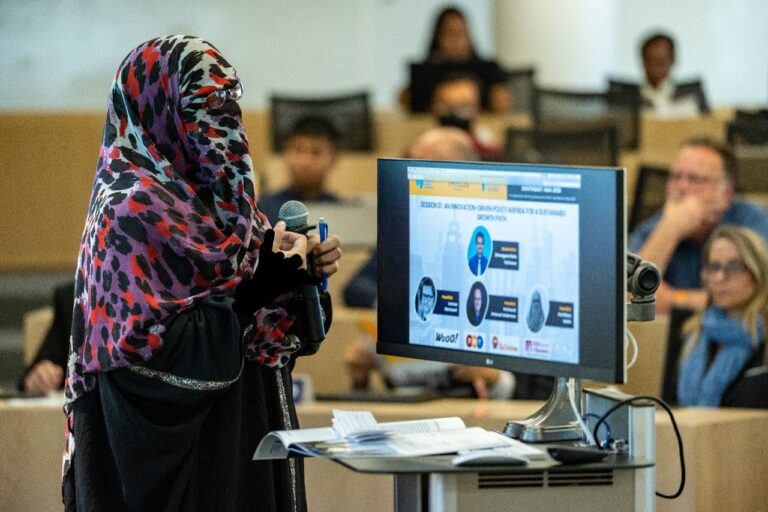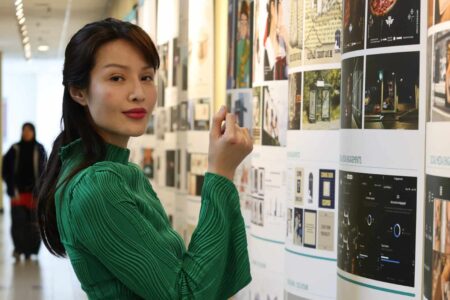
Born and raised in Multan, Pakistan, Dr. Sitara Karim’s, one of the top women in finance academia today, has loved school since young.
At nine years old, she would step up to the blackboard and lead her all-girls class when the teacher wasn’t around, earning praise from the school’s principal for her actions. Later, she graduated from high school with an A+ grade, earning high scores for her college’s pre-medical programme’s entrance exam but fell short in the selection.
She then switched to a Bachelor of Arts in Education simply because “it was very easy to do it in one year” when the usual duration was two before completing a Master of Business Administration (MBA) in Finance.
She did well but relatives brushed her success off as “luck” or the class being too easy.
“I won’t say it was by luck because, in our religion (Islam) and belief, we call that the Will of God,” says Dr. Karim. “So, by the Will of God, I topped in my first semester.”
In the remaining six semesters, Dr. Karim continued to score good grades. “Again, it was by the Will of God because I was continuously asking from him and putting in my efforts,” she says.
And she didn’t stop there – Dr. Karim’s goal was to teach at the university level, a role that required a Doctor of Philosophy (PhD) degree.
Specifically, she wanted to teach finance, a field that caught her interest during her MBA. She had been inspired by a lecturer who supervised her master’s thesis and made concepts easy to understand.
Unfortunately, her time in Pakistan’s universities met an abrupt end. Citing “political influences,” Dr. Karim wasn’t selected to join her university’s PhD programme.
She was heartbroken, more so as it was due to reasons beyond her control. “So I told myself, by God’s will, I will not do my PhD in Pakistan. I will do it abroad,” she says.

During her PhD, Dr. Karim was also a full-time mum to her three children, proving that women in finance could do anything they set their minds to. Source: Dr. Sitara Karim.
An international PhD student’s journey
In February 2018, Dr. Karim’s started her PhD in Banking and Finance at Universiti Utara Malaysia (UUM).
As she was in the third trimester of her second pregnancy then, she sought for a way to balance two massive undertakings.
First, she made a file to show her background in research and list of publications — this exempted her from courses covering the same topics.
Then, she told administrators that she can’t sit for four hours straight as she was pregnant. “It worked, and again, it was thanks to God’s will,” she says.
With this flexibility, Dr. Karim was able to focus solely defending her proposal.
She would spend hours working on it in a surau, an Islamic assembly building used for worship and religious instruction, while her husband cared for their then-one-year-old toddler.
“My husband was my motivation,” says Dr. Karim. “Every time I am down, my husband is there to support me. So, by the end of my first semester, he told me to just go forward with the proposal defence.”
By June 2018, Dr. Karim passed her proposal defence with minor corrections.
She returned to Pakistan to give birth to her son, only planning to return to Malaysia for her viva – the oral examination conducted at the end of a PhD.
Then came another challenge. When Dr. Karim approached her supervisors to prepare for her viva, she found out that she was required to produce an academic paper and publish it in a journal.
By September 2019, not too long after she delivered her third child, Dr. Karim got her first publication.
With that, she returned to Malaysia for her viva and walked away with major amendments to her thesis.
With six months to make the necessary amendments, she returned to Pakistan, completed the corrections, and passed her PhD in October 2020.
Now, Dr. Karim is an Associate Professor of Finance / FinTech at Sunway University’s Business School in Malaysia, an Associate Editor of the International Review of Economics and Finance, and guest editor of a Special Issue in Energy Economics and the Journal of Accounting and Organisational Change, among others.

Dr. Karim pictured with Professor Brian M. Lucey, Editor in Chief of International Review of Economics and Finance, and Associate Editor of top finance journals like The Financial Review, Journal of International Financial Markets, Money and Institutions. Source: Dr. Sitara Karim.
Making her mark for women in finance
Dr. Karim’s journey of earning her PhD and accolades is marked with challenges.
As a woman, she is joining a profession and a field that has historically been dominated by men.
And as a Pakistani woman, she’s faces many more odds that have been stacked against her:
- In academia, a 2024 study by the Association to Advance Collegiate Schools of Business found that among the top business schools in the US – a country where the world’s best business schools are located – only 25.7% of full professors are women.
- In the wider finance and banking industry, research conducted by McKinsey in 2021 reports that women accounted for about 52% of the industry. However, their representation fell at every step up the corporate ladder, where white women accounted for only 23% of executives. Women of colour accounted for only 4%.
- In 2019-20, the Pakistan Education Statistics Report showed that the literacy rate of women in Pakistan was 59%, significantly lower than that of men at 71%.
- The Global Gender Gap Index 2021 revealed that only 8.3% of women in Pakistan attend tertiary education.
- Another research report states that only 25% of Pakistani women with a university degree work, while most remain homemakers.
Dr. Karim bucks these stats. She’s one of the World’s Top 2% Scientists in Financial Economics in 2023 in the Stanford/Elsevier list, winner of the “Dean’s Excellence in Research Award 2023” by Sunway Business School Malaysia, and an “Outstanding Reviewer” under the Emerald Literati Award 2023.
She’s published a lot and in various top-tier journals as well.
This includes but is not limited to the European Financial Management, the British Journal of Management, the European Journal of Finance, the Journal of Economic Behavior and Organisation, the International Review of Financial Analysis, and the International Review of Economics and Finance.
“I saw on LinkedIn that people with good publications were getting some very good jobs, and I realised that that was what I was missing,” says Dr. Karim. “Then, I started working on the papers, day and night. I got my first Impact Factor paper in September 2021.”

Dr. Karim receiving the “Dean’s Excellence in Research Award” in 2023 from Sunway Business School, Sunway University, Malaysia. Source: Dr. Sitara Karim.
Why we need to support unconventional women in finance
Life, unfortunately, doesn’t get easier even when you’ve earned the highest degree you can, gained global recognition, or published more academic papers than you can remember.
For Dr. Karim, judgment for her dressing follows everywhere she goes.
As a Muslim woman, Dr. Karim wears a niqāb, a long garment covering her person that only shows her eyes and the tips of her fingers, which would otherwise be covered as well. “But I cannot touch my phone. This is the limitation,” she laughs.
But this brief humour doesn’t compensate for the realities she has faced throughout her career.
“Whenever I was in the middle of an interview, they would just stop the interview and say, ‘We can hear you, but we cannot see you.’” says Dr Karim. “I would say, ‘Okay, if you cannot compromise on your policies, I also cannot compromise on my way of dressing.’”
It even goes beyond Dr. Karim’s choice of clothing too.
“In previous work, there was some professional jealousy because I was publishing too many papers,” she says.
“I was working continuously on my papers, so some people were actually trying to push me out by saying, ‘She is not a good teacher. She’s just a good researcher.’ So I just left the job.”
As we remain in an era where many of the most famous names across the industries are predominantly white men, it’s important that support is given to the minority, especially to those who have proven themselves over and over again in their fields.
“We see those demographics even in the academic journal sites,” says Dr. Karim. Most of the journals are 90% men and 10% women. Even if we, as women, talk to them or even want to be a part of their research, they won’t support us. So, this is the challenge.”
“Yes, we have professors with whom I am in contact and who are very supportive — it’s one of the reasons I’m able to get the associate editorship. But you can say that among 10 academics, only one is supportive; the rest aren’t. Even the women are not supportive of women.”
Even strangers on LinkedIn can relate to this. Dr. Karim knows — she’s received many messages regarding these topics over the course of her career.
“I received one message from another Pakistani woman saying, ‘I’m not appreciating you for what you have achieved – I’m appreciating you for your consistency in staying in this field.’” shares Dr. Karim.
The messenger was based in a European country and for the last six months, had been asked to remove her hijab and had ultimately given in to the demands. “I replied that I would pray for her and that things get easier, but had I been in her place, I would have quit my work. I wouldn’t sacrifice my covering.”
The woman had sent a reply back, saying she agreed, solidifying her appreciation for Dr. Karim even more.
Still, it’s not a lifestyle for everyone, but Dr. Karim believes that no matter where you end up, you have to put in the effort to reach your goals.
“My suggestion for others who want to be in the field of finance is to just work hard,” she says. “Even if it is not in finance, you are the one who is going to make ways for yourself. Your hard work will help you make the base but if you’re not working hard and just sitting there just praying, things won’t work.”
So far, it has been a challenging yet fulfilling journey, and Dr. Karim is far from stopping her extensive work.
The two things that keep her going are simple: “My faith in God,” says Dr. Karim. “And whatever the challenges I have faced, I have not stopped myself. I never stopped myself from moving forward. I’d tell myself, ‘Okay, failures are part of the process.’ If we do not fail, we will not be successful. Even successful people are not always successful.”










